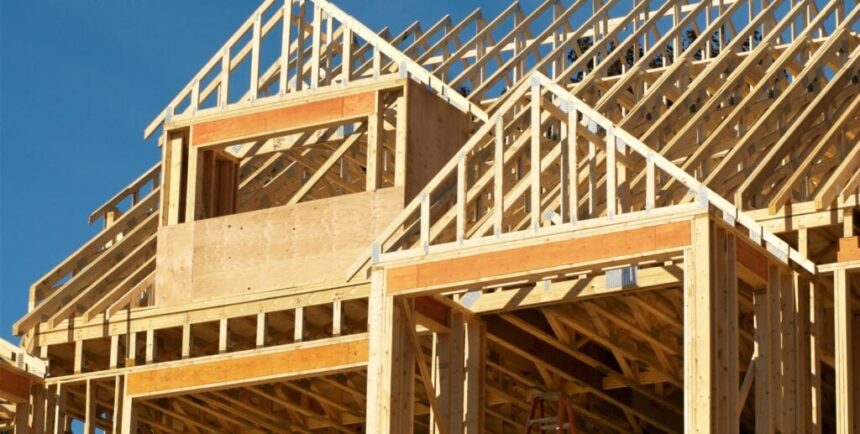Investors are building single-family rental properties at an unprecedented rate, catering to a growing segment of renters seeking more space without the commitment of buying a home or the budget constraints of a high mortgage payment. A record-high 27,500 build-to-rent homes were completed in 2023, almost triple the number of completions from two years prior, according to an analysis of Yardi Matrix data from RentCafe.
Starter homes are in short supply. In many areas of the country, entry-level homes listed below the area median home price are scarce. Even where these smaller, no-frills homes are on the market, they might not be affordable to the typical family due to a combination of stubbornly high home prices and high mortgage rates.
First-time homebuyers have come up with several solutions to the affordability crisis, including co-buying homes with their friends and living with their parents to save for a down payment. Some are also settling for less square footage and shared walls, which has led to a boom in new construction of townhomes or using the house hacking investment strategy to offset mortgage costs.
But for other millennials, finding a single-family home with plenty of bedrooms and a backyard in a neighborhood with good schools is still a top priority—even if it means they have to rent there. And some remote workers who prefer the amenities of a single-family home are choosing to rent for the freedom it provides. Therefore, demand for single-family rental homes has drawn interest from institutional investors and fueled a massive increase in the construction of homes intended for rent.
More Rental Homes on the Way
Build-to-rent housing completions have rapidly increased since 2020, when only about 7,700 single-family rental homes were completed. The trend will continue over the next couple of years, as more than 45,400 rental properties are currently under construction, most of which will be available for rent in 2025. RentCafe anticipates moderation in new rental property construction in the coming years, however.
In some cases, investors build single-family rental homes within communities that have a mix of renters and owners. But there’s also been a rise in the construction of single-family rental communities. These planned build-to-rent communities are neighborhoods of single-family homes, sometimes including multifamily units as well, all of which share a common property manager and may feature community amenities such as outdoor spaces and fitness centers.
Build-to-rent housing draws interest from renters who not only want more space, but also the newest home features. About 41% of the country’s build-to-rent houses were constructed within the last five years. A build-to-rent neighborhood holds similar appeal to a newly constructed for-sale development while often requiring a lower housing payment and allowing renters the freedom to move on without the hassle of selling.
Investors and developers have noticed the growing demand for these communities, and institutional investment in the asset class is poised for growth, according to a report from Cushman and Wakefield. For example, over the last few years, Blackstone has poured over $9.5 billion cash into single-family rental property investment.
Metro Areas with the Most Build-to-Rent Activity
In 14 of the top 20 major metro areas for build-to-rent housing, the number of completed units reached a 10-year peak.
In 2023, Phoenix stood out as a hotbed for build-to-rent activity, with more than 4,000 units completed. That’s a 164% year-over-year increase in newly built rental properties. The city has a growing population and plenty of land for expansion, according to RentCafe. In some high-demand coastal cities, limited space for development has prevented the build-to-rent movement from taking hold.
In Dallas, almost 2,700 rental homes were finished in 2023, and Atlanta followed behind with almost 2,000 build-to-rent completions. Those three cities also saw the highest numbers of build-to-rent housing completed over the last five years, with a rapidly increasing availability of single-family rental properties when compared to 2018. For example, there were only about 500 build-to-rent units available in Atlanta as of 2018. By 2023, that number increased to over 4,000.
The top five states for completed build-to-rent homes in 2023 were all in the Sunbelt:
- Texas: 4,800 units
- Arizona: 4,000 units
- Florida: 2,800 units
- Georgia: 2,181 units
- South Carolina: 1,909 units
In Texas, build-to-rent housing is particularly popular, and new construction in cities like Dallas, Houston, and Austin will only increase the already significant supply in the coming years. And in Florida, new build-to-rent construction is booming across a few different metros.
RentCafe also identified the other top markets with the most build-to-rent construction in progress. These metro areas have at least 1,000 new build-to-rent homes currently under construction, which are likely to be available to renters by 2026:
| Metro Area | Build-to-Rent Units Under Construction |
| Phoenix, Arizona | 7,236 |
| Dallas, Texas | 6,481 |
| Houston, Texas | 4,836 |
| Huntsville, Alabama | 2,487 |
| Charlotte, North Carolina | 2,426 |
| Atlanta, Georgia | 2,341 |
| San Antonio, Texas | 1,886 |
| Austin, Texas | 1,851 |
| Jacksonville, Florida | 1,836 |
| Tampa, Florida | 1,352 |
| Orlando, Florida | 1,147 |
| Salt Lake City, Utah | 1,141 |
| Nashville, Tennessee | 1,087 |
| Columbus, Ohio | 1,059 |
| Savannah, Georgia | 1,000 |
Investing in Build-to-Rent Housing
The current demand for single-family rental homes with modern amenities makes build-to-rent housing an attractive investment opportunity that offers the opportunity for stable cash flow. There are a few options for getting into the game, some with more obstacles than others:
- Build a single-family rental: One option is to buy a plot of land in a growing area and build an ideal rental home. In some ways, this might be easier than finding a turnkey rental home in a supply-constrained market. But unless you can cover the construction costs from your cash reserves, you’ll face unique challenges. The approval process for a new construction loan is often more stringent, and you may pay a higher interest rate and greater closing costs when compared to a traditional mortgage.
- Develop a rental community: If you have a strong track record of development experience and plenty of capital, you may find success with a build-to-rent development, either on your own or with a team of general partners.
- Join a private equity fund: Some private equity funds target build-to-rent investments. There may be a high minimum investment. Some opportunities may only be available to accredited investors.
- Get into real estate crowdfunding: Some real estate crowdfunding platforms, like CrowdStreet and ArborCrowd, allow people to invest in fractional shares of a build-to-rent fund or project. Some platforms are only open to accredited investors. The Fundrise Flagship Fund, which includes a portfolio of 4,700 single-family rental properties in 29 markets, is open to investors with as little as $10.
- Invest in REITs: Some private and publicly traded real estate investment trusts (REITs) are focused on build-to-rent investments. Minimum investments vary.
The Bottom Line
The number of completed build-to-rent units reached a record high in 2023. Developers and investors appear to be responding to high demand for single-family rentals among certain segments of the population, including millennials priced out of homeownership and people who choose a nomadic lifestyle. Build-to-rent activity is flourishing the most in Texas, Arizona, and Florida, but most metros experienced 10-year high completions last year.
Investors have multiple opportunities to profit from success in the sector, including active and passive investment options.
Ready to succeed in real estate investing? Create a free BiggerPockets account to learn about investment strategies; ask questions and get answers from our community of +2 million members; connect with investor-friendly agents; and so much more.
Note By BiggerPockets: These are opinions written by the author and do not necessarily represent the opinions of BiggerPockets.









